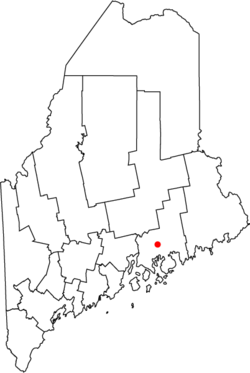Ellsworth, Maine
| Ellsworth, Maine | ||
|---|---|---|
| City | ||

Bridge over the Union River in downtown Ellsworth
|
||
|
||
 Location of city of Ellsworth in the state of Maine |
||
| Location in the United States | ||
| Coordinates: 44°34′20″N 68°28′34″W / 44.57222°N 68.47611°WCoordinates: 44°34′20″N 68°28′34″W / 44.57222°N 68.47611°W | ||
| Country | United States | |
| State | Maine | |
| County | Hancock | |
| Settled | 1763 | |
| Incorporated (town) | February 26, 1800 | |
| Incorporated (city) | February 8, 1869 | |
| Area | ||
| • Total | 93.92 sq mi (243.25 km2) | |
| • Land | 79.28 sq mi (205.33 km2) | |
| • Water | 14.64 sq mi (37.92 km2) | |
| Elevation | 108 ft (33 m) | |
| Population (2010) | ||
| • Total | 7,741 | |
| • Estimate (2012) | 7,824 | |
| • Density | 97.6/sq mi (37.7/km2) | |
| Time zone | Eastern (EST) (UTC-5) | |
| • Summer (DST) | EDT (UTC-4) | |
| ZIP code | 04605 | |
| Area code(s) | 207 | |
| FIPS code | 23-23200 | |
| GNIS feature ID | 0565863 | |
| Website | http://ellsworthmaine.gov/ | |
Ellsworth is a city in and the county seat of Hancock County, Maine, United States. The 2010 Census determined it had a population of 7,741. Ellsworth was Maine's fastest growing city from 2000–2010 with a growth rate of nearly 20 percent. With historic buildings and other points of interest, Ellsworth is popular with tourists.
According to the history of the Passamaquoddy Indians, the Ellsworth area was originally inhabited by members of the Passamaquoddy and Penobscot tribes: "Both groups speak closely related Algonquian languages, although anthropologists generally group the Passamaquoddies linguistically with the Maliseets and the Penobscots with the Abenakis." [1]
George J. Varney, in the 'Hancock County, Maine' section of his Gazetteer of the State of Maine, published in Boston in 1886, wrote:
It is likely that the French who founded a colony at Somes Sound on Mount Desert Island in 1613, under the patronage of Madame de Guercheville, explored the Ellsworth area and what is now the watershed of the Union River. Varney believes that there were French settlements of some kind or another as close to Ellsworth as Trenton, Oak Point, Newbury Neck and Surry.
The Ellsworth area was disputed between the English and the French throughout the 17th century and well into the 18th century, occasioning intermittent warfare which was known to the English as the French and Indian Wars. Native American inhabitants may have converted to Roman Catholicism and fought with the French against the British until the fall of Quebec City to the British in 1759. After the 1763 signing of the Treaty of Paris by the governments of the United Kingdom, France, Spain and Portugal, Ellsworth became part of the Commonwealth of Massachusetts.
...
Wikipedia


